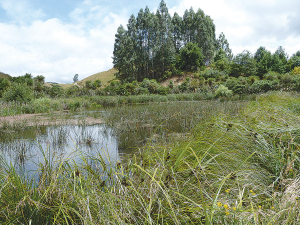South Island dairy production lifts despite stormy summer, feed risks loom
South Island dairy production is up on last year despite an unusually wet, dull and stormy summer, says DairyNZ lower South Island regional manager Jared Stockman.
 DairyNZ general manager sustainable dairy Dr David Burger says the analysis shows the good outcomes achieved by improving management practices on dairy farms to improve surface water quality.
DairyNZ general manager sustainable dairy Dr David Burger says the analysis shows the good outcomes achieved by improving management practices on dairy farms to improve surface water quality.
Scientific data collected across five catchments over the past 20 years show improvement in surface water quality.
Researchers found that, over the 20-year monitoring period, including post-extension, 70% of in-stream water quality trend directions were improving or showed no change. The median levels of most contaminants in water have also decreased, due to farmers implementing good management practices (GMPs) such as improved effluent management and stock exclusion.
The study found in-stream concentrations of phosphorus and suspended sediment decreased the most in response to on-farm work.
Overall, the research shows the implementation of GMPs on-farm does improve water quality.
As part of an ‘Our Land and Water’ study to analyse historical data, DairyNZ’s water quality science team, in collaboration with AgResearch and Lincoln University, revisited dairy farms in the Waiokura (South Taranaki), Toenepi (Waikato), Waikakahi (Canterbury), Bog Burn (Southland) and Inchbonnie (West Coast) catchments to assess whether on-farm actions have helped improve water quality over time.
The five catchments are dairy farming areas that were part of the 2001-2010 Best Practice Dairy Catchments project, which monitored water quality and environmental work on-farm. Monitoring of water quality and changes to farm practices continued from 2011-2020, as part of national long-term data collection.
DairyNZ general manager sustainable dairy Dr David Burger says the analysis shows the good outcomes achieved by improving management practices on dairy farms.
“The mitigation options dairy farmers can take to reduce footprint are widely known, but analysis of the positive impacts of these over time is less available,” he says.
“So it’s good to see this dataset showing extension efforts to help farmers improve their management practices have led to water quality improvement.”
Research lead and Our Land and Water National Science Challenge chief scientist Professor Rich McDowell says the findings are positive but also show continued action is needed in key catchments to maintain the momentum.
 |
|---|
|
Dr David Burger |
“The data shows that, over the 20-year period, many trends were improving or showed no change. However, we know nitrogen levels increased in many catchments due to development on other dairy farms over the same period.
“This means there is still more to do in some areas to lower nitrogen and E.coli concentrations. In some catchments, more than good management practice may be required, such as land-use change, to meet water quality expectations,” he says.
DairyNZ continues to work with farmers to develop on-farm practices, provide a scientific evidence base to help inform practical and fair regulations and demonstrate the positive results of the actions farmers are taking to improve the health of waterways.
Farm environment plans identify actions to improve water quality, reduce greenhouse gas emissions and increase biodiversity, and are tailored to individual farms. Currently, more than 70% of New Zealand dairy farms have farm environment plans and 45% have greenhouse gas farm plans. By 2025 all farms will have both plans.
“The dairy sector is committed to sustainable dairying and farming within environmental limits,” Burger says.
“Through the Dairy Tomorrow Strategy and other work, DairyNZ, dairy companies, sector partners and research organisations are reinforcing the value of GMPs and supporting farmers as they continue to improve their systems to achieve environmental outcomes.”
South Island dairy production is up on last year despite an unusually wet, dull and stormy summer, says DairyNZ lower South Island regional manager Jared Stockman.
Coming in at a year-end total at 3088 units, a rise of around 10% over the 2806 total for 2024, the signs are that the New Zealand farm machinery industry is turning the corner after a difficult couple of years.
New Zealand's animal health industry has a new tool addressing a long-standing sustainability issue.
The Government has announced that ACC will be a sponsor of this year's FMG Young Farmer of the Year competition.
As veterinary student numbers grow to help address New Zealand's national workforce shortge, Massey University's School of Veterinary Science is inviting more veterinary practices to partner in training the next generation of vets.
South Island dairy farmers will soon be able to supply organic milk to Fonterra.
OPINION: There will be no cows at Europe's largest agricultural show in Paris this year for the first time ever…
OPINION: Canterbury grows most of the country's wheat, barley and oat crops. But persistently low wheat prices, coupled with a…